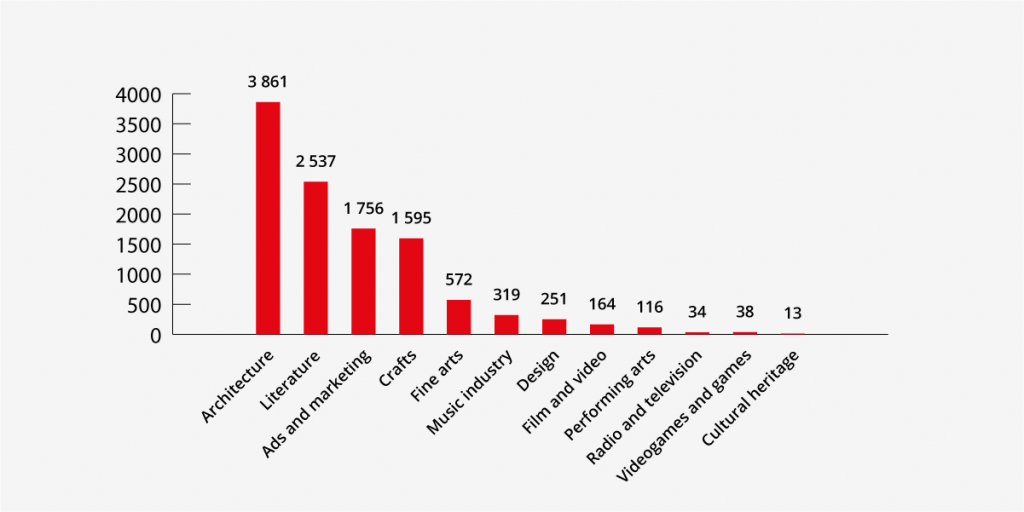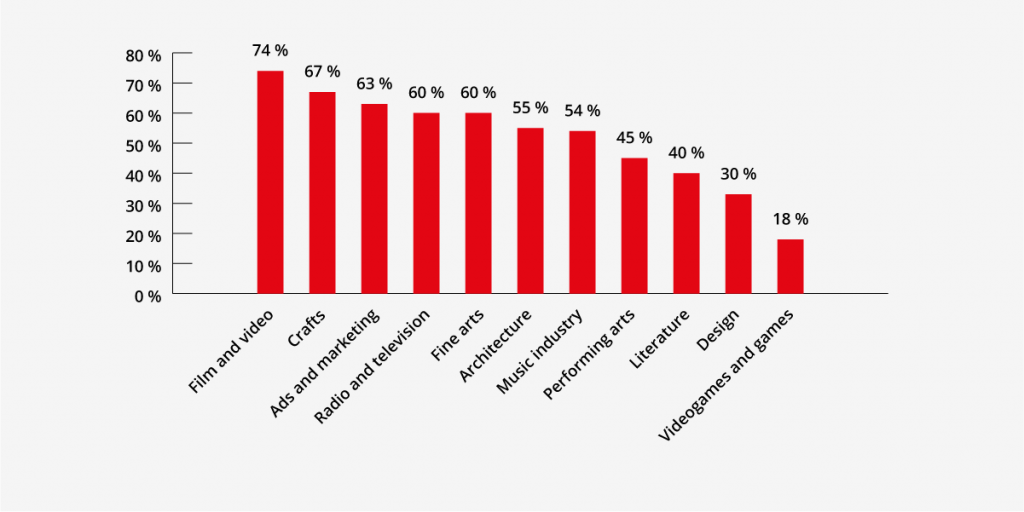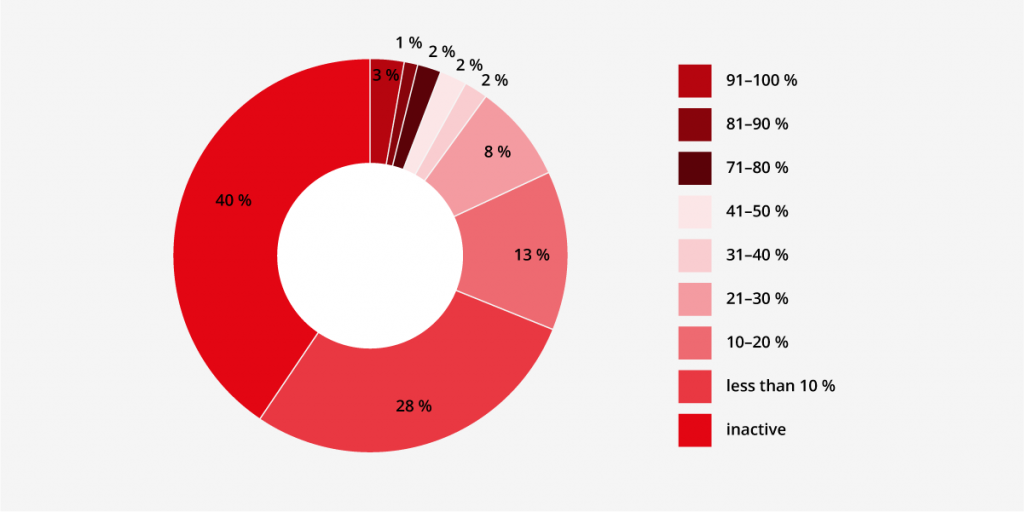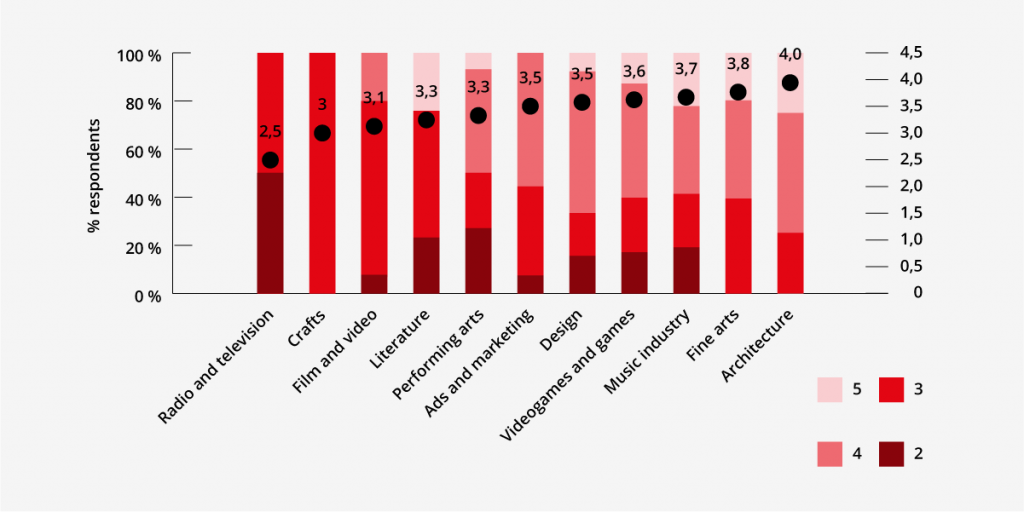MAPPING OF CULTURAL AND CREATIVE INDUSTRIES IN BRNO
creativity in brno
Brno boasts a very strong potential in the field of creative industries. The South Moravian metropolis is home to 12–23% of all creative entities in the Czech Republic. In concrete numbers, there are 12,000 entities, 20,000 employed persons, 2,000 companies, and 8,500 self-employed persons.
CCI sector in Brno by number of entities

The strengths of the cultural and creative industries in Brno include the potential for talent, the existence of traditional organizations and companies, and the education in the creative industries provided by Brno universities. Brno has an excellent geographical location for creative professions, although networking with foreign countries is still an untapped opportunity for most sectors (the exception is the video games sector). On the other hand, the inability to retain talent (they often leave for Prague and abroad) and low technical and spatial security are major weaknesses. Among the weaknesses, creative entrepreneurs often cited low entrepreneurial skills in self-assessments. Opportunities that participants would welcome include peer networking, more collaboration with schools, new forms of funding (e.g. crowdfunding), and cooperation with city authorities. The main threats remain the ongoing talent drain, worsening access to finance or lack of customer interest.
It is common practice in the creative industries to collaborate with other creative entities to do business. Video and film makers are the most likely to collaborate with other creators, while design and video game people are the least likely.
CCIs by the share of entities that carry out ancillary activities in another CCI
“Are you active in other cultural and creative industries? By activities we mean activities for which you are financially remunerated.”

Networking and exporting products and services abroad. These are the weaknesses of Brno creators. According to the results of the 2014 mapping, 81% of the surveyed entities stated that the share of their activity abroad represents less than 20% of their total activity.
KKO entities in Brno by share of activity abroad in total activity
“Please indicate the percentage of your activity in (production to) foreign countries”

On the other hand, Brno has the advantage of a large range of higher education opportunities in the creative industries. Creative fields can be studied at the Technical University, Masaryk University, Mendel University, and the Janáček Academy of Performing Arts. However, the minimal focus of study programs – e.g. on advertising or game design – can be considered a shortcoming.
One of the most serious problems in the creative industries is the lack of entrepreneurial skills. These are managerial, marketing, financial skills, and orientation in copyright law. However, even creators themselves are aware of this fact.
Level of managerial skills of start-ups by CCI sector in Brno
“Please rate on a scale of 1–5 (where 1 is excellent and 5 is poor) the level of management skills of start-ups in your sector.”

Want to know more?
Read the full study. The study is available only in Czech language.
HOW THE MAPPING WAS DONE
The survey consisted of a quantitative and a qualitative part. The main objective of the quantitative part was to map the total number of entities in the individual creative industries in Brno and to find out as much information as possible about these entities – especially legal forms, number of employees and economic data. The research used the Albertina database and a methodology based on the so-called CN-NACE codes of economic activities. The most appropriate way of mapping proved to be working with multiple databases and comparing them with each other. The basic database was supplemented by entities mapped using the so-called snowball method.
The qualitative part included mainly interviews with experts from individual sectors as well as an online questionnaire. The selected representatives jointly identified the strengths and needs of the creative industries in Brno. The methodology was prepared in cooperation with several subjects and the qualitative interviews were conducted by Petr Návrat, who has long been involved in projects dealing with urban regeneration, local economic development, and city government.